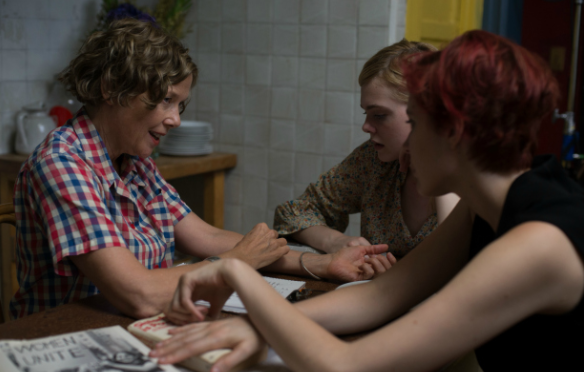Mike Mills has always slipped easily into the mindset of a teenage boy coming of age in an unconventional family. His film debut, Thumbsucker, back in 2005 focused on 17-year-old Justin Cobb (Lou Pucci) and his emotional issues with thumbsucking as a stress reliever. With his second film in 2010, Beginners, Mills explored the story of his father, who came out in his late sixties after his wife died of cancer.
With his third feature, 20th Century Women, almost following the “release a film every five years” pattern to a tee, Mills this time decides to tell the tale of his far more mysterious mother, played by Annette Bening in the role of Dorothea Fields. Because of the script’s personal nature, there is a level of veracity in it that echoes, in many ways, Ryan Murphy’s adaptation of Augusten Burroughs’ Running With Scissors. And it isn’t just because Annette Bening is once again playing the kooky mother making all manner of mistakes in raising her only son, but, even more than that, it’s the time–the late 70s–that lends such familiarity to 20th Century Women.
One could also argue that Almost Famous holds many parallels to the film, which brings up the question: just how fucked up was it for an adolescent boy to be raised by a single mother in the 70s? Perhaps because it was still such a novel affair during this period–right when divorce was becoming less stigmatized thanks to feminist literature and women’s increasing impatience for men who treated them ungratefully–and no one knew what “the rules” were just yet, there is this sense of free falling emotionalism in every movie that highlights this subject matter.
For Jamie Fields (Lucas Jade Zumann), the closeness he once felt with his mother begins to strain when he realizes she doesn’t really share anything with him, nor is she honest with him or herself about the extent of her loneliness. Though she “keeps a man” around the house in the form of William (Billy Crudup), who is not only renting one of the rooms in her oversized house but also helping her restore it, Dorothea can never bring herself to open up to anyone long enough to strike a genuine connection.
This is, in part, a result of Mills’ real mother’s tendency toward secrecy. Admitting to the many struggles in writing the character of his mother because she was, in fact, so mysterious to him (a Gemini, he noted), he would defer to her favorite actor, Humphrey Bogart, for dialogue inspiration, pointing out that the line, “Asking yourself if you’re happy is like a shortcut to depression,” is something he came up with based on his view of what Bogie would say.
Because she is so difficult to read, Dorothea feels that she alone as a parent isn’t enough for Jamie at this point in his life. Thus, she enlists the help of the other lodger in her house, Abbie (Greta Gerwig, joining Billy Crudup once again in the same cast post-Jackie), a photographer recovering from cervical cancer, and Jamie’s best friend, Julie (Elle Fanning). Though Jamie is in love with the latter, Julie tortures him with her Dawson’s Creek sleeping methods,
Mills’ go-to technique of using voiceover to tell of someone’s backstory is present for each woman, touching on Abbie’s time spent in New York City and dying her hair red after seeing David Bowie in The Man Who Fell to Earth (Gerwig has a seemingly constant connection to Bowie in film–see: Frances Ha), as well as Julie’s mother being a therapist who forces her to go to the group sessions she runs for teen girls without a father. While this method works for revealing more about the complexity of each female in the narrative, Mills takes it a hair too far when he also wields voiceover to tell what will happen to each character in the future. While this might add the layer of melancholy Mills seeks, one would almost prefer some things left to the imagination.
Elsewhere in the uniqueness of Mills’ style, every driving sequence is edited with a sort of time traveling aesthetic, inferring that to drive still means freedom during this decade–especially in California. During an epoch that then President Jimmy Carter characterized as “a crisis of confidence” (the speech of which plays prominently into one of the scenes in 20th Century Women), the only solace besides drugs people often turned to was the liberation of driving, OPEC wars or not.
Still, Carter said it best when he bluntly stated, “Human identity is no longer defined by what one does, but by what one owns. But we’ve discovered that owning things and consuming things does not satisfy our longing for meaning. We’ve learned that piling up material goods cannot fill the emptiness of lives which have no confidence or purpose.”
In addition to interweaving this element of 70s culture into his narrative, Mills also heavily employs key book titles of the period, including M. Scott Peck’s The Road Less Traveled, which signaled the popularity of self-help books in general and the decline in the belief in romantic love as a whole.
It is this impression of decay–both in matters of love and the “family unit”–that makes 20th Century Women feel as though we’re revisiting an old friend like Almost Famous and Running With Scissors. It also could have served as an alternate title to Now and Then, come to think of it. Mills explained that the appellation of the film stems from the era when the phrase “twentieth century” meant something was grand, modern. And yet, as time passes, it’s evident that the twentieth century was, indeed, filled with the corrosion of all the things the American people once believed to be ironclad.





















